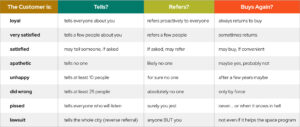Which type of customer do you have in your business? Do you harbor satisfied buyers or maintain loyal customers?
This is the question Jeffrey Gitomer seems to imply in his book, “Customer Satisfaction is WORTHLESS: Customer Loyalty is Priceless. It seems like a simple question, but the answer can make all the difference in the success of your business.
According to him, a merely satisfied customer is happy with your delivery, but are not loyal to your brand. They are prone to shop around and look for other solution providers the next time they encounter a problem. On the other hand, loyal customers will religiously be devoted to your company and your solutions. They will also influence their Realm of Association by preaching the good news of your business.
That said, the more important question is: how do you attain both customer satisfaction and loyalty?
Jeffrey Gitomer delves into the concept of customer loyalty and offers practical principles for achieving it. Let’s explore some of these principles and see how they can be applied to strengthen customer relationships.
But first…
 How Can You Measure Customer Satisfaction?
How Can You Measure Customer Satisfaction?
Before we proceed any further, let’s clarify some things. First of all, customer loyalty and customer satisfaction are not mutually exclusive. They are intertwined and interdependent.
Customer loyalty is the result of a deeper, more meaningful form of customer satisfaction. You develop loyalty among your customers when they are consistently satisfied with your services. We can both agree on that. However, Gitomer added that the secret to customer loyalty, on top of delivering great solutions, is providing top-notch customer service.
Excellent, unrivaled, unequivocal customer service is the piece that completes the customer loyalty puzzle.
Capisce? Okay.
There’s just one problem. We live in a business landscape where policies permeate customer service. In the words of Gitomer, “lots of corporate policies, but lack of corporate principles.”
Companies view customer service on a measure of scale.
“Rate 1-5 on how quick our customer service rep answered your query.“
“Rate 1-10 on how well our rep communicated during your call.“
“Rate 1-3 on how satisfied are you with our representative’s answer.“
Businesses look at customers as no more than data points. Customer satisfaction is calculated via their ratings on a linear scale. That’s not right.
Your customers don’t want your boring tale of explaining the problem or your poor excuse on why you can’t help. They only seek assurance that you care and they want to know what you can do to help them.
For this reason, Gitomer’s book explains that traditional customer satisfaction scores are meaningless. The only measure of genuine customer satisfaction is if it leads to customer loyalty.
If you want a loyalty-building level of customer satisfaction, you need to upgrade your customer service game. Wizard of Sales® can help transform your customer service reps from robots to genuinely caring human beings. Give us a call and let’s talk about it.
Jeffrey Gitomer’s “Ladder of Customer Service”
In his book “Customer Satisfaction is WORTHLESS. Customer Loyalty is Priceless,” Jeffrey Gitomer outlines his “Ladder of Customer Service.” The ladder shows the range of status that customers feel towards your business. From the bottom end is “lawsuit” while the pinnacle is “loyal” customers.
Each step within the Ladder of Customer Service describes three things:
- First: to whom will your customer share what they felt doing business with you?
- Second: to whom will they refer your business based on their satisfaction level?
- Third: will they buy again from you?
The table below is a quick summary of Jeffrey Gitomer’s Ladder of Customer Service:
At the extreme bottom, Jeffrey calls it the lawsuit stage. This doesn’t always happen to sellers, but it could if you deliberately deliver faulty products and problematic services. While proving this in court is challenging, you may still be liable. Know that this absurd level of customer dissatisfaction is the worst, and it will tarnish your integrity as a business.
If we then look at the topmost three types of customers, we’ll see satisfied, very satisfied and loyal. Being [very] satisfactory is not enough if you want to build an army of followers. Satisfied people may tell a few people about your good works, but there’s no surety that they’ll be repeat customers.
Conversely, when you strike the customer loyalty bell, that’s when you unlock their full features. Loyal customers will preach your business, evangelize other people to choose your solutions and always returns to buy from you.
Therefore, this ladder holds the belief that customer satisfaction alone is not enough. Instead, businesses should strive to create loyal customers who become brand ambassadors and actively promote your products or services.
But, how do we make that happen? Jeffrey Gitomer outlines 13 principles for customer service success and we’ll discover them below:
The 13 Principles of Customer Service Success
Do you want to attain customer satisfaction that makes people re-purchase and go above and beyond recommending you to others? Yes? Then improve your customer service.
Whenever you serve your customers, the secret is changing your mindset into “helping people win,” first. Don’t concentrate on your policy, focus on the customer reaching out. Stop with the excuses and cut the blatant reasoning. Remember, the success of the people equates to the success of the company.
Now that you have that out of the way, here are Jeffrey Gitomer’s 13 principles of customer service success:
Principle #1: Your customer is your paycheck.
They say don’t bite the hands that feed you, and that statement holds true to this day.
Before you go all praises and adoration to your employer, stop and think for a second. Who exactly is the source of your paychecks?
Is it your boss who signed the check but didn’t directly put the money there? Or is it the customers who bought your solutions and generated income for the company?
The idea is simple. No customer equals no money. Therefore establishing customer satisfaction and loyalty means everything to you, your team and your boss. Here’s the rub, when you give poor customer service to your buyers, you’re biting the hands that feed you.
Application: Always work for your customers’ satisfaction. Sales and loyalty will follow.
Principle #2: Your attitude determines your excellence.
Have you heard of the law of attraction? It says, what you think or embody eventually becomes your reality.
In the quest for customer satisfaction, the same principle applies.
Your positive attitude becomes the foundation that determines how you perform and serve your customers. Maintaining a positive outlook is the key to creating a positive perception from your market.
Now, what exactly is “positive”? Is it having a bubbly voice and a gleeful disposition when talking to a distressed customer?
Certainly not. A positive attitude is a product of strong company culture. Strong company culture is one that invites reinvigoration to streamline processes and give customers the best possible experience.
The key phrase here is “best possible experience.” What is the best experience for a troubled customer?
Simple, answers.
Application: Maintain an enthusiastic and friendly tone, and address customer concerns by helping them. Better yet, change your company culture into something that caters to customers, always.
Principle #3: When customers call, contact or visit you, they need HELP.
First of all, customers won’t call you because they wanted a chatmate. Most of the time, it’s because they require HELP. Sadly, too often companies only represent the HELL in HELP.
When you send an automated attendant to a distressed customer, you know they’ll tell people about their awful experience. With all the automated barriers they go through, customers are already exasperated before they reach your reps. Plus, when you hit them with the classic “but our company policy states…” bullshit narrative, you unleash their inner Karen.
There’s no point in escalating problems to that level. You just need to respond the right way.
Application: Understand the root cause of their call and find the BEST response to their specific need.
 Principle #4: A customer’s value is 20 times their annual sales volume.
Principle #4: A customer’s value is 20 times their annual sales volume.
A loyal customer that spends around $1,500 per year in your residential home service business is worth $30,000. Keep in mind that repurchasers will buy from you repeatedly for an indefinite period of time if you don’t mess it up. That amount is what you’ll earn by keeping them around. Conversely, it’s also what you’ll fail to earn when you lose them.
Customer acquisition costs 6 to 10 times more than customer retention. So when a buyer latches on to your business and shows genuine loyalty, do your best to keep them around.
Application: Every touchpoint with a customer should be future-facing. Remember that every interaction is an opportunity to earn their next sale. Make interactions as positive and customer-oriented as possible.
Principle #5: Repeat customers are a big business advantage.
In relation to the previous point, having repeat customers is a big advantage to your business. This is especially true for residential home service providers.
Think about it. People will only buy from you in response to a need, and that need doesn’t come as frequently. How many people have asked you to install AC units thrice in the same home for three consecutive months? Exactly.
You are selling an externally triggered grudge purchase. In other words, people buy only when they need to and never because they want to. That said, having repeat customers means you also become the go-to business for upgrades, repairs, inspections and check-ups.
That’s a big win! You can then upsell your club membership which completely adds customers to your list of captured audiences.
Application: In every touch point of your business, prioritize building bridges and breaking barriers. You want to have a relationship with your audience, not just be “another service provider.”
Principle #6: Customer satisfaction is worthless.
Merely satisfaction is no longer an appropriate measure of customer service and company success. You want loyalty to become the norm in your business, and loyalty is an enhanced level of satisfaction. In the coming years, given many residential home service businesses sprout all around, loyalty will become the measure of success.
When customers are loyal to you, and you remain helpful and faithful in serving them, competitors can’t convert your people.
Application: Try to look inward and ask yourself “what builds my loyalty towards a person or brand?” Then project those actions to your customers.
Principle #7: The most powerful advertising is word-of-mouth.
Jeffrey Gitomer says word-of-mouth advertising is 50 times better and more effective than traditional advertising. He’s correct.
How many times have you gone back-and-forth on a company waiting for a person to validate your choice? When people validate and tell you good things about a product or service, your confidence upsurges. The same story applies to businesses.
When your word-of-mouth advertising is strong, it’s indicative that your customer service is also spot on. Trust me, put two people that preach your brand in a 10-man group, and you’ll win all of them over.
Application:
Do these three things:
- Ask around what the word on the street is regarding your business.
- Ask yourself, do you ensure that your customer service promotes positive word-of-mouth advertising?
- Produce content that centers around helping customers, excellent customer service, positive word-of-mouth advertising and deliver unrivaled value.
Principle #8: Customers will begin talking when you’re done speaking.
Following the word-of-mouth advertising segment above, your customers will begin talking after their session with you. Civil customers may remain all smiles and maintain composure while in front of you, but they won’t hold back after.
Whatever comes out of your talk, whether good or bad, will be their principal thoughts. Therefore, it’s important to knock all customer service calls out of the park to be in their good graces. Once you do that, you’ll receive positive word-of-mouth advertising for free.
Application: Begin the call positively and end it on a positive note. Make sure everything in between is also positive.
Principle #9: Friendliness and helpfulness are directly correlated to success.
All things being equal, your customers will always want to do business with their friends.
Why? They trust them more.
This level of trust can cushion the impact of business misunderstandings. In your business, you should come as the friend and authority that your customers go to for their needs. This builds your image as a trusted advisor and companion.
In customer service, you can build that same level of trust when you display friendliness and helpfulness at all times. The question is, how friendly are you, really?
Application: Always greet your customer warmly and offer assistance whenever possible. Show them that you genuinely care about their needs and want to help them in any way you can.
Principle #10: Prioritize customers over company policy.
We get it, companies have policies that guide every activity and expectations from your employees. However, your company policy must always be anchored on sound customer service principles.
What principles are those? To realistically help customers in all ways possible.
According to Jeffrey Gitomer, customer service and company policy are oxymoronic terms. Why? Because customers don’t ever want to hear the word “policy” come up in your conversation.
Application: When you encounter a policy hurdle, don’t say the word “policy.” You can instead say, “Let me see what I can do to…” or “in order to be fair with everyone…“
Principle #11: Service is a feeling.
Let’s be real.
You know what excellent service feels like. You are also completely aware if a business skimped on giving you good service. The customer will always remember how you made them feel.
The principle is simple, and it’s founded on the teachings of the Chinese philosopher, Confucius:
“Do not do unto others what you do not want others to do unto you.”
Or as Wizards prefer to apply – the platinum rule: Do unto others as they would prefer to be done unto.
Application: Give your customers the same level of service you’ll classify as great. Do that consistently on a daily basis.
Principle #12: Begin customer support with a YES!
A customer’s request may not always be possible to fulfill. Instead of immediately saying no, find a way to say yes, figuratively. This doesn’t mean you have to fulfill every single request. What it means is that you’re willing to try and search for alternatives to give the customers the answer.
In customer support, lame excuses and reasoning won’t cut it. Solutions will always be met with smiles and approval.
Application: Every time you craft your response, frame it from an angle of positivity and resolution. For example, you could say, “the best course of action is…” or “here’s what you can do that will help…“
Principle #13: The customer’s perception is the measure of your customer service success.
Remember that your personal evaluation of success is meaningless if customers think otherwise. The customer’s perspective will always be the principal determinant of the success or failure of your business. It’s always a good idea to think forward:
- What will customers say about my business after this conversation?
- Will customers purchase from my business again based on how our talk goes?
- Can I expect positive or negative word-of-mouth after this?
Application: Always prioritize fulfilling the pain points and soothing the pleasure points of your customers in customer service.
At the core of these 13 principles, the best solution is always to go back to your company culture.
Is your culture geared towards helping customers or is it focused on making money? When customers become the main priority, your customer service, sales reps and all touch points naturally become customer-oriented relational experiences (CORE).
Want to create a happy, healthy, wealthy culture? Wizard of Sales® can help straighten out your customer service, culture and sales experience and make them customer-focused. Book a free call and we’ll work on that.


 How Can You Measure Customer Satisfaction?
How Can You Measure Customer Satisfaction?
 Principle #4: A customer’s value is 20 times their annual sales volume.
Principle #4: A customer’s value is 20 times their annual sales volume.